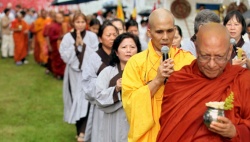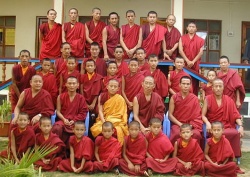Let’s Talk: Get Ready for Conflict
Genjo Marinello says sanghas must take steps to prepare for ethical breaches and conflicts before they happen.
Since 1999 I’ve been the abbot of Chobo- Ji in Seattle and a student of my ordination teacher, Genki Takabayashi Roshi, and my dharma lineage father, Eido Shimano Roshi. From the perspective of both student and teacher, I have experienced all sorts of heartache arising from conflict within the sanghas where I have practiced. I know what it feels like to be accused of behavior I did not do. I know what it is like to be called on behavior I did do that was unwelcome and misunderstood. I know what it is like to call students on the carpet for inappropriate behavior. I know what it is like to see the most well-intentioned process of reconciliation between aggrieved sangha members go awry. I know firsthand what it is like to sit on a governing board and an ethics committee investigating ethical breaches of a beloved teacher.
When conflict arises within a close community, how do we deal with it? This matter is especially important and more difficult when someone in a position of authority is suspected of wrongdoing. Buddhist sanghas are supposed to represent the epitome of harmony, communication, mindfulness, skillfulness, and compassion. How then do we approach the inevitable conflicts that arise in all real communities between real people with real limitations and shortcomings? If the behavior of the spiritual leader is called into question, who has the authority or even the chutzpa to investigate and hold them accountable? Many groups have fairly well-defined statements of ethical behavior, and some have well-designed mechanisms for dealing with misunderstanding, conflict, and ethical breaches. However, as we all know, poor behavior cannot be legislated away, and the success of conflict resolution even when the rules are well thought out will largely depend on the skillfulness of the participants.
In the Zen tradition, sesshins (concentrated periods of seated meditation) are structured to be intense. They are designed to help us drop the artificial barriers that normally separate “self” from “other.” The theory is that after our normal defenses are exhausted through the rigors of a sesshin, we will be raw enough to experience our true nature. This is all well and good, but when we are exhausted we feel more sens itive, vulnerable, and uninhibited. This can lead to saying or doing things we regret. If the structure of a sesshin is strong, it can help us contain and channel the primal nature that is exposed. Most Zen groups have sufficient structure for this, but experience has taught me that additional safeguards such as clear policies help manage the unleashed energy.
The most essential ingredient of any ethics and reconciliation policy is that the process be alive. The policy needs to be regularly reviewed, updated, and made known. If not, when it is called upon to work, it will have little support or effectiveness. In addition, there must be a standing ethics committee that rotates members regularly, in staggered fashion. Everyone on the committee should have training in communication skills and professional ethical guidelines. Ideally the committee should have autonomy from the board of directors, with the majority of the committee not on the board, and perhaps include invited members of neighboring sanghas.
At Chobo-Ji we make sure that at least one person is designated at the beginning of each weeklong sesshin to represent the ethics committee. This person is given time at the beginning of the retreat to outline basic guidelines, which are also posted, and becomes the initial go-to person if there is some incident that needs attention. Between sesshins, our policies are posted in our sangha lounge along with the membership of the ethics committee, including contact numbers. The policy is also on our website. If an incident occurs in which one or more parties want assistance, then three people from the ethics committee will be assigned to oversee the process to hear and resolve the issues. If the three assigned ethics committee members determine that a face-to-face meeting with the concerned parties would be useful to resolve the issue, and the concerned parties agree, a reconciliation meeting will be scheduled and facilitated. If the incident represents a serious ethical breach or a serially repeated pattern, the full ethics committee will meet, conduct a fuller investigation, and make recommendations to the board for action.
If the incident involves a leader in the sangha, everything becomes more complicated. It is extremely hard for a leader or teacher to be objectively assessed by sangha members. Therefore, in this kind of situation, ethics committee members from outside the sangha should be recruited to assess a possible ethical breach. Chobo-Ji’s ethics policy states, “For any situation concerning a potential ethical breach by an ordained member of the community, the policy of the Chobo-Ji board is to refer to an outside group (for example, the Faith Trust Institute or a similar organization with expertise on the matters in question).” In my mind, it is also essential that there be organizational structures allowing for a clear separation of powers between a spiritual leader and a board of directors with legal and fiduciary oversight. The majority of board members should be elected by the sangha, not selected by a spiritual leader.
Other important safeguards include opportunities for the sangha to regularly be exposed to issues concerning ethics. For example, Chobo-Ji has recently held focus groups on the precepts and nonviolent communication, and discussions based on the book Sex and the Spiritual Teacher. A crucial point to remember when ethical breaches cause profound heartache is that governing boards must reach out to those directly harmed and alienated. Deep healing is not possible unless those harmed feel comfortable enough to return. They may decide not to, but every effort should be made to ameliorate the damage, including, when appropriate, organizational apologies and financial support for counseling for those in need.
Having read this far, I ask, have you read your sangha’s ethics policy recently? Does it include clear workable steps for assessment and reconciliation? Does an active committee that has real autonomy and authority support the policy with regular reviews and updates? Is there suitable separation of powers between the governing board and the spiritual leaders? It is everyone’s responsibility to be mindful of these concerns. Without this effort, be assured that unchecked power will corrupt and apathy will lead to misfortune and heartache. We can— and must—do better.
Genjo Marinello Osho is the abbot of Chobo-ji, a temple in the Rinzai-Hakuin lineage of Zen in Seattle, Washington. He studied with the founding abbot of Chobo-Ji for twenty years, and later trained with Eido Shimano Roshi, who declared him a dharma heir in 2008. He is also a psychotherapist in private practice.


